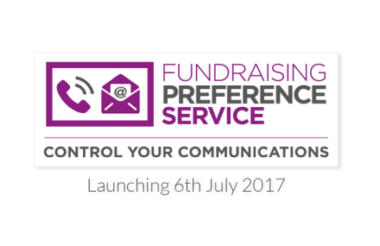The Fundraising Regulator has made amendments to the Code of Fundraising Practice in relation to general principles and working with third parties ahead of the launch of the Fundraising Preference Service in July.
The Fundraising Regulator has announced today that it has introduced new rules to the Code of Fundraising Practice which deal with the length of time charities will have to communicate with supporters who sign up to the FPS.
According to the new sub-section of Code 5.2 organisations: “Must either cease within a reasonable period (meaning as soon as is practicable, but in any event no exceeding 28 days) or not begin to process an individual’s personal data for the purpose of direct marketing where they receive notice from or on behalf of an individual to do so. This may include:
- notice in writing from (or on behalf of) an individual, whether or not described as a formal section 11 request (under the Data Protection Act 1998)
- notice from (or on behalf of) an individual submitted through the Fundraising Preference Service or notice from the Fundraising Preference Service that such a request has been made.
- Any other indication of wishes from an individual (or made on their behalf) that that they do not wish to be contacted for direct marketing purposes, such as via preferences and unsubscribe mechanisms.”
The change above is listed as being a legal requirement for all charities.
The regulator has also made changes to the Code in relation to charities working with third parties. As of today, organisations must require any agency or third party “to inform them of any notice” they have received to cease or not commence direct marketing from an individual.
It also says that charities must require third party clients to comply with any of the notices made above and cease communicating with an individual within 28 days of being notified.
The changes to third party rules are not a legal requirement, but are still a requirement of the Code of Fundraising Practice.
The Fundraising Regulator first announced this 28-day deadline at an event earlier this month. At the time, Daisy Houghton from the regulator said 28 days represented “the minimum amount of time we can expect charities to action a suppression request”.
She also said however, at the point of suppressing a charity using the FPS, the individual would be warned that that timeframe maybe not be practical for some charities, particularly on large-scale, direct marketing campaigns.
Only large charities need to register ‘at this stage’, says Dunmore
Stephen Dunmore, chief executive of the Fundraising Regulator, said in a statement that his organisation had written to “those charities that do the most fundraising to ensure they are ready to receive FPS requests”.
He said only the largest fundraising charities in the UK “need to register” at this stage, but said all other fundraising charities need to know what the FPS is and “be ready” in the event a supporter signs up.
“We have written to those charities that do the most fundraising to ensure they are ready to receive FPS requests. While only these largest charities need to register at this stage, all charities need to make sure that they know what the FPS is and are ready in the event that they receive a ‘stop’ notification.”
Suzanne McCarthy, chair of the Fundraising Regulator’s standards committee, said: “It is important that members of the public have confidence that charities will respect their communication preferences. The changes made to the Code today support the introduction of the new FPS and require all charities to stop sending direct marketing communications on receipt of a request made through the service.”
The FPS is scheduled to go live on 6 July 2017.
Related Articles












